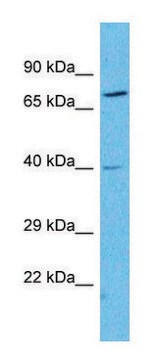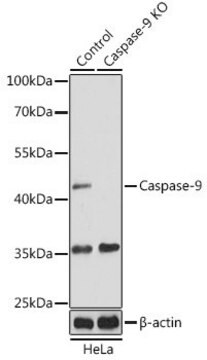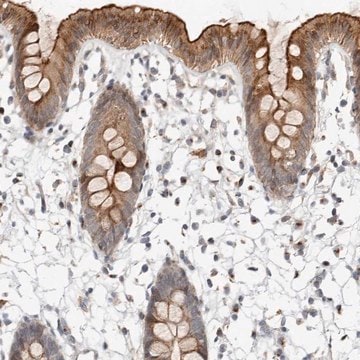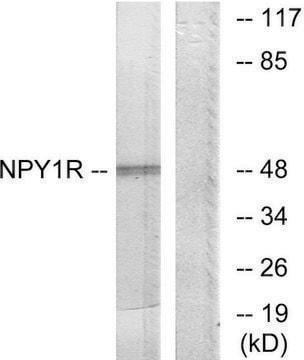おすすめの製品
由来生物
rabbit
結合体
unconjugated
抗体製品の状態
affinity isolated antibody
抗体製品タイプ
primary antibodies
クローン
polyclonal
形状
buffered aqueous solution
分子量
antigen 42 kDa
化学種の反応性
human, mouse, rat
濃度
~1 mg/mL
テクニック
ELISA: 1:1000
immunofluorescence: 1:100-1:500
western blot: 1:500-1:1000
NCBIアクセッション番号
UniProtアクセッション番号
輸送温度
wet ice
保管温度
−20°C
ターゲットの翻訳後修飾
unmodified
遺伝子情報
human ... NPY2R(4887)
関連するカテゴリー
詳細
The NPY2R (neuropeptide Y receptor Y2) gene is mapped to human chromosome 4q32.1 and codes for a G-protein-coupled receptor. NPY2R is predominantly expressed in central nervous system including hypothalamus, brain stem, hippocampus, lateral septum and amygdala. NPY2 receptors are also distributed in the liver, spleen, intestine, adipose tissue and muscle.
免疫原
The antiserum was produced against synthesized peptide derived from human NPY2R.
Immunogen Range: 1-50
Immunogen Range: 1-50
生物化学的/生理学的作用
NPY2R (neuropeptide Y receptor Y2) acts as a presynaptic autoreceptor and heteroreceptor. It regulates the release of both endogenous NPY and neurotransmitters such as glutamate and γ–aminobutyric acid (GABA). NPY exerts its anxiolytic function via the NPY2R. Deletion of NPY2R results in retardation of the anticonvulsant actions of NPY. NPY2R plays an important role in the process of bone formation.
特徴および利点
Evaluate our antibodies with complete peace of mind. If the antibody does not perform in your application, we will issue a full credit or replacement antibody. Learn more.
物理的形状
ウサギIgGのPBS溶液(Mg2+およびCa2+を含まず)、pH 7.4、150 mM NaCl、0.02% アジ化ナトリウム、50% グリセロール
免責事項
Unless otherwise stated in our catalog or other company documentation accompanying the product(s), our products are intended for research use only and are not to be used for any other purpose, which includes but is not limited to, unauthorized commercial uses, in vitro diagnostic uses, ex vivo or in vivo therapeutic uses or any type of consumption or application to humans or animals.
Not finding the right product?
Try our 製品選択ツール.
保管分類コード
10 - Combustible liquids
WGK
nwg
引火点(°F)
Not applicable
引火点(℃)
Not applicable
試験成績書(COA)
製品のロット番号・バッチ番号を入力して、試験成績書(COA) を検索できます。ロット番号・バッチ番号は、製品ラベルに「Lot」または「Batch」に続いて記載されています。
Tao Yang et al.
Cellular & molecular biology letters, 28(1), 60-60 (2023-07-28)
Sebaceous glands (SGs) synthesize and secret sebum to protect and moisturize the dermal system via the complicated endocrine modulation. Dysfunction of SG are usually implicated in a number of dermal and inflammatory diseases. However, the molecular mechanism behind the differentiation
Debanjan Chakroborty et al.
British journal of cancer, 127(8), 1440-1449 (2022-07-29)
Resistance to anti-angiogenic therapies targeting vascular endothelial growth factor-A (VEGF-A) stems from VEGF-A independent angiogenesis mediated by other proangiogenic factors. Therefore identifying these factors in colon adenocarcinoma (CA) will reveal new therapeutic targets. Neuropeptide Y (NPY) and Y2 receptor (Y2R)
Viswanthram Palanivel et al.
Cells, 11(22) (2022-11-27)
Neuropeptide Y (NPY), a sympathetic neurotransmitter, is involved in various physiological functions, and its dysregulation is implicated in several neurodegenerative diseases. Glutamate excitotoxicity, endoplasmic reticulum (ER) stress, and oxidative stress are the common mechanisms associated with numerous neurodegenerative illnesses. The
Yuka Akagi et al.
FEBS open bio, 14(1), 63-78 (2023-11-28)
Food-derived biological signals are transmitted to the brain via peripheral nerves through the paracrine activity of gastrointestinal (GI) hormones. The signal transduction circuit of the brain-gut axis has been analyzed in animals; however, species-related differences and animal welfare concerns necessitate
Gopi Kumar Mittapalli et al.
Bioorganic & medicinal chemistry letters, 24(2), 430-441 (2013-12-25)
Neuropeptide Y (NPY) is one of the most abundant neuropeptides in the mammalian brain and exerts a variety of physiological processes in humans via four different receptor subtypes Y1, Y2, Y4 and Y5. Y2 receptor is the most abundant Y
ライフサイエンス、有機合成、材料科学、クロマトグラフィー、分析など、あらゆる分野の研究に経験のあるメンバーがおります。.
製品に関するお問い合わせはこちら(テクニカルサービス)








